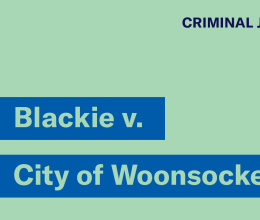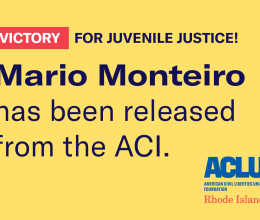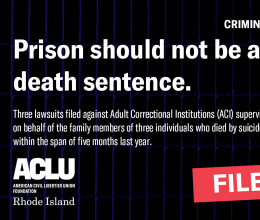The Rhode Island ACLU today said it would appeal a ruling issued yesterday in a federal lawsuit filed last year against the R.I. State Police, challenging the legality of the detention and transporting to immigration officials of fourteen people, all Guatemalans, who were stopped in a van on I-95 after the driver changed lanes without using a turn signal. The lawsuit, filed by RI ACLU volunteer attorney V. Edward Formisano on behalf of eleven of the individuals, argued that the actions by the state police violated the state’s Racial Profiling Prevention Act, as well as the driver and passengers’ constitutional rights to be free from discrimination and from unreasonable searches and seizures. However, U.S. District Judge Mary Lisi has ruled that the officers’ conduct was lawful.
The lawsuit noted that the detention ensued even though Thomas Chabot, the state trooper who stopped the van, confirmed that the license and registration of driver Carlos Tamup were valid, and that Tamup had no criminal record. Utilizing Tamup as a translator, Chabot nonetheless asked all the passengers to also provide identification. When some did not produce ID, Chabot asked if they possessed any documents demonstrating their U.S. citizenship. After further delays, the trooper advised them that they would all be escorted to the Office of Immigration and Customs Enforcement in Providence. According to the complaint, Chabot advised Tamup that any passenger attempting to escape from the van en route to Providence would be shot.
The van stop generated significant controversy in the civil rights community. At the time, more than a dozen organizations sharply criticized then-State Police Superintendent Steven Pare’s support of the trooper’s actions, which came less than a month after a state police representative misleadingly told a community forum that the State Police did not seek to enforce immigration laws. The groups further claimed that the traffic stop had created a “chill” in the Latino community, with residents fearful of contacting the police to report crimes lest their own immigration status be investigated.
RI ACLU executive director Steven Brown said today that an appeal would be filed. He called “particularly startling” the judge’s ruling that the trooper did not violate the state ban on racial profiling, which bars the continued detention of vehicles during traffic stops unless there is “reasonable suspicion or probable cause of criminal activity.” The ruling does not explain what suspected criminal activity was involved, since mere presence in the country illegally is not a crime.
Brown said: “This was a classic case of racial profiling. The driver’s license and registration were in perfect order, so the continued interrogation of the passengers was clearly based solely on their ethnicity. It is distressing that these serious claims have been summarily dismissed, for it only demonstrates the difficulties racial minorities face in vindicating their right to equal protection of the laws.” Brown said that the decision also pointed to the continued need for strengthening the state’s racial profiling law, which police departments have resisted. A series of reports issued by Northeastern University and the RI ACLU have documented how racial minorities in Rhode Island are much more likely than whites to be stopped and searched by police, even though they are less likely to be found with contraband.








